What Is “Electability” Anyway?
There's a lot of talk right now about "electability." but what the heck does it mean?
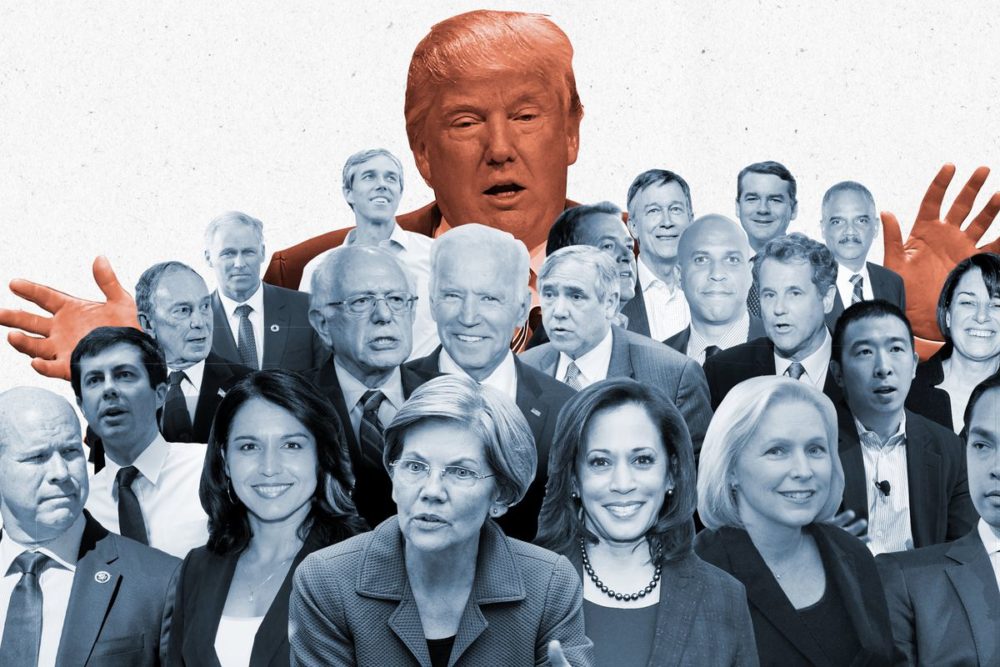
As the Democratic field for the 2020 Presidential nomination takes shape, pundits, candidates, and Democratic voters, many of whom are saying their primary concern is a nominating a candidate who can beat Trump, are talking about the idea of “electability.” As The Washington Post’s Dan Balz notes, though, it’s not entirely clear what that means:
“Electability” is the watchword among many Democrats this spring as they begin to evaluate the ever-growing field of candidates for their party’s presidential nomination. The question of who can beat President Trump weighs heavily in voters’ assessments. But is that the real measure that produces presidents?
Electability is an elusive concept. It is not one of those that fits into the category of, “I know it when I see it.” It is born of individual biases and the conventions of history, often the search for something that seems to replicate something that was successful before. But a look back at presidential campaigns of the past suggests something else has been more powerful in determining who wins the White House.
Four years ago at this moment, almost no one, except perhaps the man himself, believed that Donald Trump was electable. He wasn’t even a formal candidate, after all. Although he had been on the edge of the political stage, conventional wisdom afforded him little chance of becoming the 45th president. On the electability scale, he was in the low range.
Twelve years ago at this time, Hillary Clinton was judged to be the most-electable Democrat seeking the nomination. A New York senator, former first lady and part of the then-best brand in Democratic politics, she had the attributes that added up to being most electable.
Barack Obama, then a relatively new U.S. senator, was considered much more a long shot. As he said later, he believed he had about a 25 percent chance of winning the nomination — good enough to make the race but certainly no iron lock for someone whose race alone made him a long shot in the eyes of the conventional wisdom committee.
Four decades ago at this moment, Jimmy Carter was a little-known, one-term governor of Georgia, just starting to make his way around the country, carrying his own bag and sleeping in the homes of friendly Democrats. Who thought he was electable in a field of more than a dozen candidates, including several prominent senators with vastly more experience and recognition within their party?
(…)
What these successful candidates had was something other than the aura of electability. They had something that connected with voters more directly, more personally and more deeply. They stirred passions and in some cases anger. They excited. They inspired. They built followings. Obama’s “Hope and Change,” and Trump’s “Make America Great Again,” were not based on the theme of electability. Quite the opposite. Obama’s pre-campaign book was entitled “The Audacity of Hope” for a reason.
The best candidates tell a story, paint pictures, turn personal biography into something that connects them to the wider electorate. Experience can matter, but it is not enough just to argue personal readiness to serve as president.
Successful candidates match a moment in the history of the country. For Carter, running two years after the resignation of Richard M. Nixon, it was the promise of something fresh, untainted by Washington, a message of integrity, rectitude, even righteousness, after the poison of the Watergate scandal.
Bill Clinton won in 1992 in part because other more prominent Democrats decided not to challenge George H.W. Bush, who was at about 90 percent in the polls in the spring of 1991. Early in the cycle, Clinton was hardly an obvious or likely winner. It was his New Democrat message, combined with the promise of generational change, that overcame his personal vulnerabilities and eventually won over an electorate that was ready to move on after 12 years of Republican presidents
Balz is correct in his review of the history of recent Presidential elections and what they say about the entire concept of “electability.” When pundits have pondered this issue in the past, they’ve typically focused on things such as a candidates resume. This is why many people believed that Richard Nixon was more “electable” than John F. Kennedy, that George H.W. Bush seemed like the more natural candidate for President over Ronald Reagan in 1980, and that Ted Kennedy seemed like he could make history and become the first candidate in the modern era to defeat an incumbent President in a primary battle. In each of these elections and more, though, it turned out that it was the candidate who people thought was not electable that ended up winning the election. Indeed, of all the elections going back to 1968 one could argue that the only time the “electable” candidate won was Richard Nixon in 1968 and 1972 and George H.W. Bush in 1988. Every other time it’s seemingly been the upstart or “surprise” candidate who has ended up winning the election.
Quite honestly, after the election of 2016 one would think that the entire concept of “electability” ought to be tossed out the window. Heading into the General Election, there was essentially nobody who believed that Donald Trump could win either the Republican nomination for President or the General Election, especially not in a head-to-head match with a candidate who, at least on paper, seemed as though she was destined to be President. Trump defied all those odds, though, and ended up winning the Republican nomination quite easily and putting together a coalition of states in the Electoral College that few people thought a Republican would be able to put together, especially in the Midwest. that allowed him to eke out a narrow win even though he became one of only five Presidents in American history to win the Electoral College while losing the popular vote, and in Trump’s case the popular vote loss wasn’t even close.
Additionally, this is a candidate who spent the majority of the campaign attacking Mexicans, Muslims, disabled people, a Federal District Court Judge who happened to be Mexican-American and a Gold Star Family who happened to be Muslim. In the month before he became President we learned about a tape from Access Hollywood on which he said many demeaning things about his treatment of woman and he was credibly accused by nearly two dozen women of sexual harassment. We also learned after he became President that at this same time he was engaging in a conspiracy with his lawyer Michael Cohen to buy the silence of two women he had affairs with while he was Melania was pregnant with their son. Since becoming President, he has continued those attacks and broadened into others, such as defending white supremacists who marched in Charlottesville and referring to N.F.L. players who were peacefully kneeling to protest racially biased police violence as “sons of bitches.” If ever there was a candidate who was the nominee of a major party who one could point to and say ‘this candidate is unelectable,’ it was Donald Trump. Despite all of that, he won the election.
So does this mean that the entire concept of “electability” needs to be tossed out the window? Perhaps it does.
As we sit here some eighteen months away from the 2020 General Election it’s hard to say with any degree of certainty what the deciding issues in the campaign will be going forward. Surely, the state of the economy will be a major factor, and for the moment that is one that leans heavily in favor of the President. The international situation may also play a role but, quite honestly, there isn’t much on the horizon that looks like it could become a major issue in the campaign. The wars that the United States is fighting around the world are mostly kept off the front page, and there has not been a substantial international incident so far in Trump’s first term that the public is likely to focus when the go to vote. It’s possible that the various investigations of the President may yet yield something that will prove problematic for the President but, so far, that has not materialized.
On the other side of the equation, the President’s job approval numbers remain historically low, most Americans say they won’t vote for him in 2020, and he’s already trailing several of his potential Democratic opponents in early polling. Based on these factors, it looks like Trump has an uphill battle ahead of him notwithstanding the fact that the odds favor his being re-elected.
So where does all of this leave the entire concept of “electability?” Perhaps what it tells us is that we shouldn’t be too quick to judge a candidate based on their resume, on past history, or on biases about who may or may not “look” the most Presidential either in person or on television. In the end, the most electable candidate is the one who can convince the most voters in the right states to vote for him or her. Predicting who that might be, especially this early in the race, seems like a futile exercise.

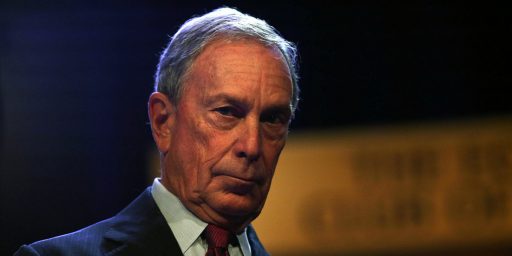
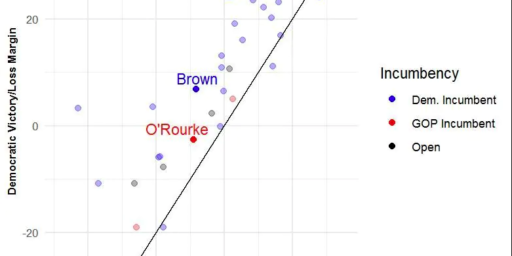

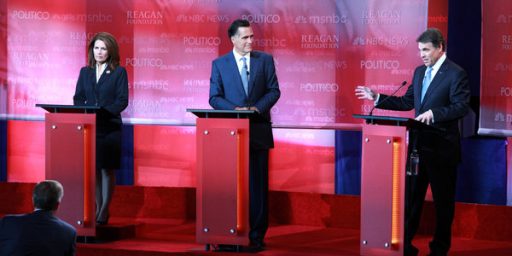
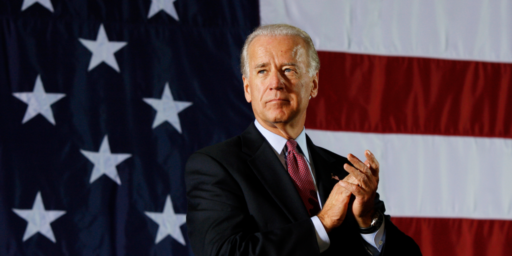
I remember watching Al Gore get torn apart for sighing, and get painted as a liar for trivia while George W. Bush lied his keister off throughout the campaign. The press just didn’t like him, but Bush was their buddy.
Howard Dean was torn apart for a poorly placed microphone.
No one liked John Kerry. He was elitist.
Clinton was, of course, held to special standards because of Clinton rules.
It’s not just a matter of charisma, as Clinton was likable enough. I’ve come to the conclusion that a candidate’s electability is simply a matter of being friendly to the media, and getting them to eat sugar cubes out of the candidate’s hand. Who can get the best press out of the most mediocre accomplishments?
I’m trying to come up with a counter example, but I’m failing. McCain was a master of this, but so was Obama, so that’s kind of a wash.
The media are gatekeepers, and so it’s no good connecting with voters if the media focuses on Warren’s 1/1024 Cherokee heritage rather than her actually connecting to voters.
Handicapping the Democrats right now, I’d say that Biden, Beto and Buttigieg have all demonstrated this at one point or another, but I worry about Beto and Buttigieg’s long term ability to keep it up. Buttigieg has been kind of amazing, but brilliant-policy-wonk-with-no-policies seems like a hard sell long term.
Harris seems to underperform a little, but might make up for it with bigger accomplishments, but that’s likely hopeful optimism on my part (not that she will have bigger accomplishments, but that they will make a difference).
I think Cory Booker must be feeding the press tofu dogs or something.
Electability usually only matters on the margins. Elections tend to come down to fundamentals — how the economy is doing, who is in power right now, etc. The “fundamentals” models have generally done a good job of predicting elections regardless of who the candidates are.
Until 2016.
The fundamentals favored a GOP win by about 5 or 6 points (through several different approaches). Instead Trump lost the popular vote by 2 points. That was *entirely* on his electability; even many of his own voters didn’t like him. As long as the Democrats don’t nominate someone that vile, as long as they nominate someone who says all the things you’re supposed to say, electability won’t matter … much.
That having been said, it is an uphill battle. The economy is still good. And it’s really hard to beat an incumbent with a good economy; arguably hasn’t happened since 1828. Still … Trump broke the mold by having the worst post-incumbency performance in political history. Might break the mold on this one too.
‘Electability’ is a code-word for a kind of elitism. It’s an explicit assertion that the election will be decided by people who are not able to see past the lies and smears and mischaracterizations to cast their votes on the merits of the candidates. Unfortunately, it’s probably correct.
When Trump’s victory was certain, I turned to my wife and said “The Democrats had better nominate George Clooney next time, or they have no chance.” Nothing I’ve seen from the two dozen hats in the ring has yet changed my mind about that.
I have always thought it just meant having someone who can win the general election. Not that many people vote in the primaries, and the ones who vote tend more extreme in their politics. What you hope is that you have someone who is able to at least appease the base who vote in the primary, yet still appeal to more moderates in the general.
Steve
In 2015 I was arguing over OTB comments that Hillary Clinton had lots of name recognition and that people were confusing name recognition with popularity. She was losing or not reaching 50% against random Republicans in head to head polls.
I don’t think that she was the poster child for electable politicians. Obviously, it’s very hard to make contractuals with these: we never know how Gary Hart or John Glenn would have fared against Reagan in 1984. Or if Mario Cuomo could have done better than Dukakis in 1988.
But there are candidates that are more electable – that are more enticing in a general-election- than others, I’m sure that it is. I don’t think that Tulsi Gabard could win regardless of the “fundamentals”.
It’s a long way to say “Not Bernie.”
@DrDaveT: As much as I think Americans want a spokesman rather than a President, I don’t think it would solve the underlying problems in America — stagnant to declining middle class, and Republicans. I’ve advocated for nominating George Clooney in the past, and I think he would win, and that a Clooney administration would be preferable to another 4 years of Trump, but I think we need something bolder.
I guess it depends on the VP, or other power behind the pretty face. And it’s a very pretty face. If he were just a figurehead for another Obama administration, I’d say “meh” even though I would love to see the Clooney campaign appropriate “Make America Great Again” and point to Obama as when America was great.
Honestly, as miserably uncomfortable as it makes me to say it, I think another Trump administration would discredit Trumpism more than losing to a milquetoast Democrat. Trump is incompetent, and I fear that the successor to a non-discredited Trumpism would be competent, and get voted in in 2028.
I don’t have the firm belief in my convictions to vote for another Trump administration, but there’s a bit of the extremist “it has to get worse before it gets better” running around in my head.
And yet, my favorite is the McKinsey consultant with the one-eyed dog. I so want that extremist part of me to be wrong.
——
My vote is swayed a bit by the discovery that Beto has a turtle named Gus. There are certain pet-related panders that I am susceptible to.
@Gustopher: Meh. The only real problem with tofu dogs is that they’re not greasy enough so that you can grill them on one of those rotary grills like they have at 7-11 so they come out evenly salty all over.
A small point, but one that niggles at me. Daniels had her one-night stand with Trump and McDougal had her ten-month affair with Trump months after Melania gave birth to Barron Trump.
Hobby horse time: while I fully understand HRCs shortcomings, using her as an example of not “electable” candidate is to forget that under any normal system of presidential election, she would have won.
I understand the failed EC strategies in WI, etc. But the narrative that she lost because she was unlikable and, ergo, “unelectable” flies in the face of the simplest of popular metrics: the number of votes won.
@Steven L. Taylor:
Under a normal system she wouldn’t have been facing a candidate like Donald Trump. While she did get more votes than he did nationally, and she did come right to the brink of winning electorally, this was against the most unpopular candidate in history. The fact is that both candidates had favorability ratings in the toilet, his slightly worse than hers, but both abysmal to an unprecedented degree. So it was kind of like a negative version of the old conundrum of the unstoppable force vs. the immovable object. When unelectable is faced against unelectable, someone has to win.
As I’ve said before, for a variety of reasons I’m skeptical of the whole concept of electability. Of course some candidates are stronger than others, but these things are not static and can depend on circumstances. If Hillary had been the nominee in 2008, I think she would have won easily. Likewise, I’ve been arguing for a while now that it’s roughly 50/50 that Trump wins reelection, simply because of his position as an incumbent presiding over a strong economy (for the moment, anyway). He may still lose, but he’s in a better position now than he was in 2016, and therefore is more “electable” than before. My biggest problem with the concept of “electability” is that it’s usually expressed as some kind of absolute, either-or quality, and it leads people to ignore the surrounding circumstances which may be just as–if not more so–important than the candidate’s particular strengths and weaknesses.
@DrDaveT:
Not Clooney. Tom Hanks for the Democratic nominee in 2020.
@CSK:
Wouldn’t that be a confirmation of QAnon?
“…a conspiracy theory that’s based on the idea that special counsel Robert Mueller and President Donald Trump are working together to expose thousands of cannibalistic pedophiles hidden in plain sight (including Hillary Clinton and actor Tom Hanks) and then send them to Guantanamo Bay.”
Whenever I hear anyone use the term “Electability” I think they’re grasping at straws because they desperately want to tell themselves they don’t have to discuss actual policy. Or, as is the case with the current Democrat party consultants [and with many consultants in other fields who have constantly failed] they’re trying to create a role for themselves just to get some cash. “Who can help you figure out the magic elixir to navigate this indeterminate concept you’ve never heard of?” To be clear, their role is entirely useless — it is, however, very well-paid.
Here’s a novel concept for the Democrat party: Have the best policies – and sell them clearly/directly to the people. The politician who is the most electable is simply the one who will do the most for constituents’ lives.
Trump, of course, was the one who in 16 was willing to assert he would do the most for people.
@Gustopher:
John McCain cracked that nut.
@Steven L. Taylor:
To some extent, I get the highlight the contrasts folks. It’s stupid, but I get it.
Had Hillary won, 2016 til now would have played out entirely differently and we would poll-wise be achin’ for anyone but her now. Benghazi would still be a massive thing. Trump’s shenanigans would be an afterthought at best.
The Replacements / Achin’ To Be
https://youtu.be/at4DL40FQ7Y
Thought about, not understood – she’s achin’ to be
(BTW, this is not a HRC song, if that isn’t achingly obvious)
This bit was a rush to judgement and wrong:
Had Hilary won, the world be substantially different, and we’d be fixated on entirely matters.
https://youtu.be/DU6IndADEWI
Bob Stinson was the best fucking guitarist I ever saw
There is a distinction between technically and functionally. outside of this gig, Bobby was not functional as a person, very sadly so
@Steven L. Taylor:
yeah. Long ago I started ignoring anybody who said things like ‘Hillary lost because she-“. Nope. Hillary lost because we have an indefensibly stupid system.